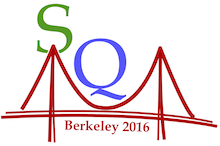Speaker
Roli Esha
(University of California - Los Angeles)
Description
Heavy quarks are considered as an important probe to understand the properties of the Quark Gluon Plasma (QGP) created in relativistic heavy ion collisions. These are produced on a short time scale in hard partonic scatterings during the early stages of the nucleus-nucleus collision. The probability of thermal production of heavy quark pairs in the high temperature phase of the plasma is expected to be small in existing accelerator experiments. Therefore, the total number of charmed quarks is frozen very early in the history of the collision. The measurement of charmed meson ($D^{0}$, $D^{\pm}$, $D^{\pm}_{S}$ etc.) $v_{2}$ is expected to reflect information from very early stage of the collision. Among all the open charmed mesons, the charm-strange mesons, $D_{S}^{\pm}$, is identified as a particularly sensitive probe for the hot nuclear medium because of its unique valence quark composition. The production of $D^{\pm}_{S}$ can be influenced by the charm-quark recombination with strange partons through enhanced thermal production of strange quarks in the deconfined matter.
A study of elliptic flow of open charm mesons, $D^0$ and $D_S ^\pm$ using quark coalescence as a mechanism of hadronization within the framework of a multi-phase transport model will be presented. The transverse momentum dependence of the elliptic flow parameter at mid-rapidity ($|y|$ $<$ 1.0) for minimum bias Au+Au collisions at $\sqrt{s_{NN}} = 200$ GeV (RHIC) and Pb+Pb collisions $\sqrt{s_{NN}} = 2.76$ TeV (LHC) for different values of partonic interaction cross-section and QCD coupling constant will be discussed. We have compared our calculations with the experimentally measured data at the LHC energy. We will also present the effect of specific viscosity on elliptic flow of open charm mesons within the transport model approach. Our study indicates that the elliptic flow of open charmed mesons is more sensitive to viscous properties of QGP medium compared to light hadrons.
| On behalf of collaboration: | None |
|---|
Author
Roli Esha
(University of California - Los Angeles)
Co-authors
MD NASIM
(University of California, Los Angeles)
huan huang
(UCLA)
Peer reviewing
Paper
Paper files:
